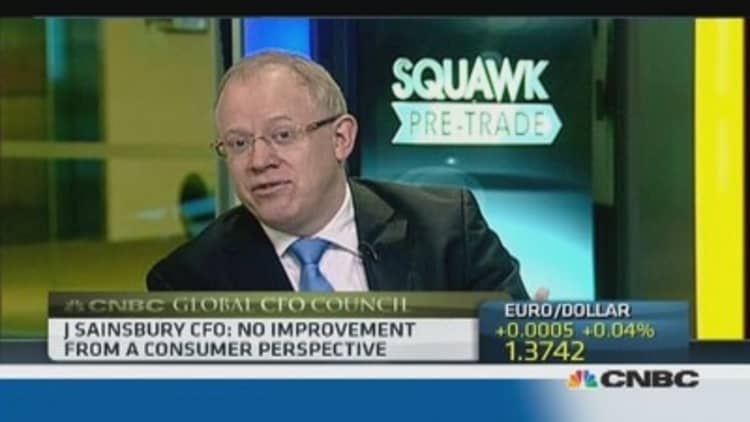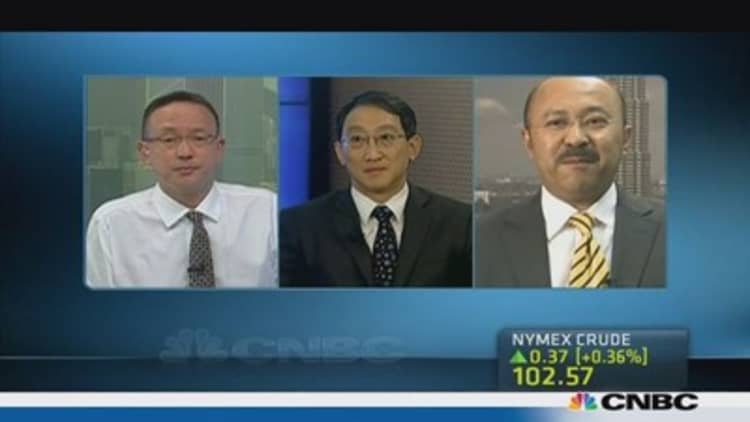
With wage rises failing to match the flickering signs of an upturn in the global economy, chief financial officers have told CNBC that a lack of consumer spending is a major fear for their companies.
CNBC asked 51 chief financial officers (CFO) from Europe and Asia who make up the CNBC CFO council to give their insight on the state of the world economy and conditions for doing business. Nearly half of the respondents ranked weakening consumer demand as their strongest concern for their business. No other risk factor even came close, with fears of a China slowdown receiving 16 percent for their highest ranked concern.

The results match a similar signal from CFOs in the America. In December, the U.S.-based members of the exclusive Global CFO Council ranked weakening consumer demand as one of biggest issues keeping them up at night.
(Read More: )
In the U.S., consumer spending accounts for more than two-thirds of economic activity. The Commerce Department's latest statistics showed spending increased 0.4 percent in December after rising by a revised 0.6 percent in November. This beat analysts' expectations but weak income growth suggested the economy could cool off a bit in the first quarter. Household income, after adjusting for inflation, fell 0.2 percent in December, according to the Commerce Department.
And it's a similar story in Europe. In the U.K. before the global financial crash of 2008, wage growth of close to 5 percent was seen as the norm. On Wednesday, new data showed average weekly pay, including bonuses, climbed 1.1 percent in the three months to the end of December, according to the Office for National Statistics. With inflation currently standing at 1.9 percent, this means people's spending power is getting weaker.
The main focus at the World Economic Forum in Davos in January was how the economies across the globe can achieve inclusive growth and how to get wages rising along with the stellar gains seen in stock markets. With economists in agreement that lower wage growth is the main factor holding back consumer spending, it's easy to see why companies are worried.
(Read More: Debunking the top three myths about income inequality)
John Rogers, the chief financial officer of U.K. supermarket Sainsbury's told CNBC Monday that his business had not seen any change in customer behavior, despite an improving outlook for the country's economy.
Indeed, Rogers said that January sales growth had been very flat, with one of the worst levels for growth in nine years.
"In real terms (consumers') spending power has gone backwards," he said, indicating that wage increases had failed to match the rise in the price of goods.
"Until we see that trend reverse I don't think we'll see significant growth," he said.
China growth fears also remain firmly in focus for the CFOs surveyed despite coming second to consumer demand in the fear rankings. China's gross domestic product (GDP) growth fell to its slowest pace in 14 years in 2013 with a reading of 7.7 percent, compared to government's target of 7.5 percent. The country's new leadership is stepping up regulation, curbing an overheated credit market and switching an export-focused economy into a consumer-driven one.
76 percent of CFOs in the CNBC survey thought that the GDP figure for 2014 would dip below the 7 percent level. 32 percent said it would post growth of between 6-7 percent, 28 percent thought it would be between 5 and 6 percent. 4 respondents thought it would dip even lower than 5 percent.
Despite expectations of ailing growth, the majority of CFOs believed that the world's second largest economy wouldn't experience an official "hard landing" in the next six months. A hard landing is deemed to be an economic state where an economy slows down sharply or is tipped into outright recession after a period of rapid growth. More than the respondents believe there was a low risk of this happening in the first half of 2014.
Meanwhile, focusing on technology, consumer goods and services are the two main industries that are most likely to be early adopters of the virtual currencies such as bitcoin, according to the survey. The cryptocurrency enjoyed a rally at the end of last year with its price in dollars surging to over $1,200. However, since then it has suffered a sharp fall with regulation and processing problems tainting the initial growth and interest in the digital currency.
Nonetheless, the consumer goods and services received the most votes from our CFO respondents, when disregarding the technology sector. The financial industry came shortly behind in third place with sectors such as basic materials, healthcare and utilities seen as having little uptake.
—By CNBC.com's Matt Clinch; Follow him on Twitter @mattclinch81






